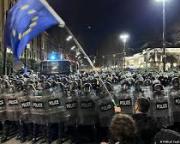Ara rusul kanons
On April 17, 2024, the Georgian Parliament passed the first reading of the "Transparency of Foreign Influence" law. Commonly referred to by the public as the "Foreign Agents Law" or the "Russian Law" due to its resemblance to similar Russian legislation, the law prompted mass protests outside the Parliament building that same evening. Demonstrations continued daily, with the number of participants growing each day. Nevertheless, the law was adopted in the second reading on May 1, and on May 28, the presidential veto was overridden by a parliamentary majority.
In essence, the law introduces the concept of a "conduit of foreign influence," which applies to any media outlet or NGO whose annual budget is 20% or more funded by foreign sources. The law mandates these entities to file an annual financial declaration, which will be made public. Additionally, the state reserves the right to monitor these organizations at any time and access their personal data. Non-compliance with the law results in hefty fines (approximately $10,000) or the complete cessation of the organization’s activities.
It is clear that this bill has left no one indifferent in Georgia and many beyond its borders. The number of protesters has increased, as has the number of detained demonstrators. Discussions about the law are taking place at home, at work, on public transport, in public places, and, of course, in front of the Parliament building.
One can reasonably conclude that the opponents of the "Russian Law" far outnumber its supporters. This is likely because the protesters are much more vocal in expressing and defending their opinions. When speaking with them, it becomes evident that Georgian society is outraged not only by the legal aspects but also by the political and moral implications of the law.
Firstly, following Russia's de facto occupation of a significant portion of Georgian territories through its proxies, anti-Russian sentiments are strong in Georgia, especially among the youth. Therefore, a bill modeled after Russian legislation predictably sparked protest reactions. Moreover, the ruling party attempted to pass a similar law a year ago but was forced to abandon it due to public resistance.
Secondly, the Georgian people value their freedom highly. This makes them very sensitive to any attempts to restrict their liberties, including the activities of civil society institutions such as the media and NGOs. This sensitivity can often be instinctive and unconscious.
Thirdly, a significant portion of Georgian society views Georgia as part of the Free World, founded on democratic values. Over the past decades, the Georgian state has repeatedly declared its European aspirations. However, the adopted law clearly contradicts the fundamental principles of democracy and significantly complicates the process of European integration, causing extreme dissatisfaction among many Georgian citizens.
Fourthly, the moral aspect cannot be overlooked. One of the characteristics of Georgian culture is the strong horizontal connections within society. As a result, the number of protesters increased significantly after Georgian law enforcement began using force. Relatives, friends, acquaintances, and just concerned citizens rushed to support their loved ones and fellow citizens.
To be fair, supporters of the "Russian Law" also gathered in central Tbilisi. However, there are grounds to believe that this demonstration was centralized and organized by the ruling party with significant use of administrative resources. Witnesses claim that participants were allegedly bused in from somewhere, and many of them were social sector workers. The leader of the ruling party addressed them, justifying the necessity of the law with narratives echoing the Kremlin's rhetoric (hence the nickname "Russian Law"), claiming that Western and pro-Western media and NGOs promote and protect LGBT relations and drug addiction, undermining "traditional" values and morals.
However, even a superficial analysis of the "Russian Law" reveals that its essence is not to protect against states exerting influence through propaganda, such as how Russian media operates in Free World countries, but rather to make cooperation between civil societies of different countries extremely difficult or even impossible in Georgia. This can be seen as the first step toward persecuting dissent and, consequently, destroying democracy.
It is worth recalling that after the tightening of a similar law in Russia, one of our organizations was designated a foreign agent and completely lost the ability to operate legally. Many of its most active members were forced to leave their homeland to ensure their personal safety.





